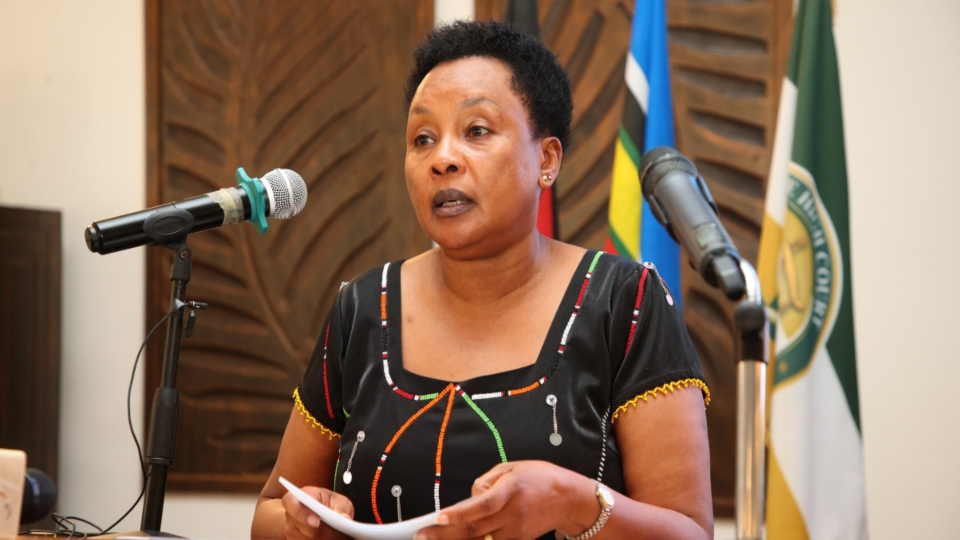Deputy Chief Justice Mwilu Cleared of Misconduct Allegations in Gachagua Impeachment Case
The Judicial Service Commission (JSC) has dismissed a petition seeking the removal of Deputy Chief Justice Philomena Mwilu from office, ruling that allegations of gross misconduct, incompetence, and constitutional violations related to her role in the impeachment case of former Deputy President Rigathi Gachagua did not meet the threshold for her ouster. The decision marks a significant development in a legal saga that has gripped Kenya's judiciary and political landscape, raising questions about judicial authority, constitutional interpretation, and the integrity of high-stakes legal processes.
The petition, filed by Nairobi resident Belinda Egesa, accused Mwilu of unlawfully assigning a three-judge bench to hear a case challenging the swearing-in of Deputy President Kithure Kindiki, who replaced Gachagua following his impeachment. Egesa argued that Mwilu's actions constituted a usurpation of powers reserved exclusively for Chief Justice Martha Koome under Article 165(4) of the Kenyan Constitution, which grants the Chief Justice authority to empanel judges for cases involving substantial questions of law. The petition further claimed that Mwilu's conduct breached the Judicial Service (Code of Conduct and Ethics) Regulations 2020, undermined public confidence in the judiciary, and reflected incompetence.
The controversy stemmed from Mwilu's decision on October 18, 2024, to appoint Justices Eric Ogola, Anthony Mrima, and Freda Mugambi to preside over a High Court case in Kerugoya. This case, initiated by three Kirinyaga county residents, sought to challenge the legality of Gachagua's impeachment and Kindiki's subsequent appointment. The Court of Appeal, in a ruling on May 9, 2025, found that Mwilu's empanelment of the bench was unconstitutional, as the power to assign judges is reserved for the Chief Justice. The appellate court, comprising Justices Daniel Musinga, Mumbi Ngugi, and Fred Ochieng, noted that no evidence was provided to show that Mwilu was acting as Chief Justice or that exceptional circumstances justified her actions. This ruling led to the nullification of the bench's decisions, including the lifting of conservatory orders that had temporarily halted Kindiki's swearing-in.
Egesa's petition to the JSC argued that Mwilu's actions had far-reaching consequences, including a "crisis of legality and institutional integrity" within the judiciary. She contended that the unconstitutional empanelment led to irreversible outcomes, as Kindiki was sworn in as Deputy President, replacing Gachagua. The petitioner further alleged that Mwilu's misinterpretation of her constitutional role demonstrated an inability or unwillingness to comply with legal norms, compromising her suitability to hold the office of Deputy Chief Justice.
However, the JSC, in its ruling, found no evidence of bad faith or intentional misconduct on Mwilu's part. The commission highlighted that at the time Mwilu assigned the judges, the legal framework governing the delegation of such duties was ambiguous. This ambiguity was only clarified by the Court of Appeal's May 9, 2025, verdict, which established that only the Chief Justice has the authority to empanel benches under Article 165(4). The JSC emphasized that Mwilu's actions appeared to stem from a genuine legal uncertainty rather than a deliberate violation of the Constitution. Consequently, the commission concluded that the petition did not meet the criteria for removal under Article 168 of the Constitution, which outlines grounds such as mental or physical incapacity, breach of judicial conduct, bankruptcy, incompetence, or gross misconduct.
The Gachagua impeachment case has been a focal point of legal and political contention in Kenya. Gachagua, impeached by the Senate in October 2024 on 11 charges including corruption, gross misconduct, and violation of the Constitution, challenged the process in court, arguing that Mwilu's empanelment of the bench was unlawful. His legal team, led by lawyers Dudley Ochiel and Kamotho Njomo, also accused the National Assembly of taking contradictory positions on Mwilu's powers. In a separate case in 2021, the National Assembly had argued that the Deputy Chief Justice lacked authority to empanel benches, securing stay orders to halt the dissolution of Parliament over the two-thirds gender rule. Yet, in the Gachagua case, the Assembly initially supported Mwilu's actions, prompting accusations of judicial estoppel and abuse of the court process.
Gachagua escalated the matter to the Supreme Court, seeking to block the National Assembly's appeal against the Court of Appeal's ruling. He argued that allowing the Assembly to reverse its stance on Mwilu's powers would erode public trust in the judiciary. The Supreme Court case remains pending, with Gachagua requesting a stay of High Court proceedings until the matter is resolved. His legal team also challenged the inclusion of certain documents in the National Assembly's appeal, alleging they were introduced without permission to bolster a weak case.
The JSC's decision to clear Mwilu comes amid heightened scrutiny of her tenure. This marks the third attempt to remove her from office, following previous allegations of misconduct in 2021 and earlier in 2025, both of which were dismissed. In a separate case, Mwilu and six other Supreme Court judges secured a temporary reprieve from disciplinary proceedings, underscoring the intense pressure facing Kenya's judiciary.
The ruling has significant implications for ongoing legal battles, including a High Court case set to determine the legality of Kindiki's appointment as Deputy President on July 31, 2025. The High Court, now awaiting directions from Chief Justice Koome to reconstitute a new bench, has postponed proceedings in light of the Court of Appeal's decision. Additionally, advocate Kelly Maleya has filed a petition to prevent the withdrawal of Gachagua's impeachment-related cases, arguing that they raise critical public interest issues concerning the constitutional process of impeachment.
Mwilu's clearance by the JSC reinforces her position within the judiciary but does not fully resolve the broader legal and political questions surrounding Gachagua's impeachment. The case continues to highlight tensions between judicial authority, constitutional interpretation, and political maneuvering in Kenya, with the Supreme Court's forthcoming decision likely to set a precedent for the powers of the Deputy Chief Justice.


